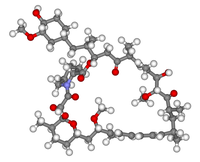
Photo from wikipedia
Kirsten rat sarcoma viral oncogene homolog (KRAS) is a proto-oncogene of the RAS-MAPK pathway. KRAS mutations are present in a variety of malignancies including lung, colorectal, and pancreatic cancer. Until… Click to show full abstract
Kirsten rat sarcoma viral oncogene homolog (KRAS) is a proto-oncogene of the RAS-MAPK pathway. KRAS mutations are present in a variety of malignancies including lung, colorectal, and pancreatic cancer. Until the recent approval of sotorasib, a KRAS G12C inhibitor, lack of targeted therapy for KRAS has resulted in poor prognosis of patients with tumors harboring KRAS mutations. While the conditional approval of sotorasib was a major breakthrough for those patients harboring KRAS G12C mutations, G12C only accounts for a fraction of those with KRAS mutations and eventual resistance to G12C inhibitors are unavoidable. This comprehensive review on KRAS inhibitors covers accumulating evidence on not only the G12C inhibitors but also other therapeutic attempts to tackle KRAS including combination therapy as well as direct inhibition with vaccines, adoptive T cell therapy, proteolysis-targeted chimeras (PROTACs) and CRISPR/Cas9.
Journal Title: Cancer treatment reviews
Year Published: 2021
Link to full text (if available)
Share on Social Media: Sign Up to like & get
recommendations!